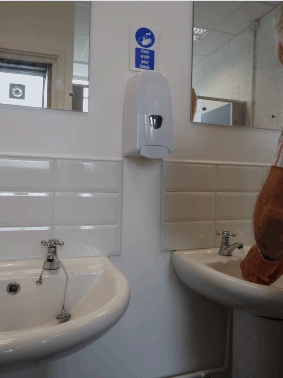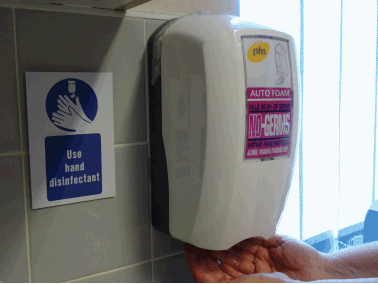Earlier this month, the Health Service Journal published a report on the current state of patient safety in the NHS. Entitled The Case for Patient Safey: Financially, Professionall and Ethically, it is a wide-ranging report that covers a number of different concerns; however, one point in particular stands out:
"[T]here's a long list of clinical risks where, seen through the lens of patient safety, we have to act, and the NHS can be a world leader. There are still enormous improvements to be had from improvements in areas such as sepsis and acute kidney injury. And one of the biggest threats facing all healthcare systems, anti-microbial resistance, needs to be comprehensively tackled as an emerging patient safety threat."
Today, we'd like to tell you how you can personally help to prevent the spread of anti-microbial resistance with the UK and its National Health Service. But first...
What IS anti-microbial resistance?
The World Health Organisation (WHO) defines anti-microbial resistance as the "resistance of a microorganism to an antimicrobial drug that was originally effective for treatment of infections caused by it". In layman's terms: once scientists have found the cure for a particular disease, that disease may - over time - build up a resistance to the cure. This is called 'anti-microbial resistance'.
Why is this a problem?
Because infections will pose a far more serious threat to human life if they become resistant to antimicrobial treatments. Illnesses that are currently treatable may eventually become life-threatening if their anti-microbial resistance builds up.
What can I do about it?
We're glad you asked! The following actions are recommended by the WHO itself - here's what you personally can do to tackle anti-microbial resistance:
- Wash your hands. This simple act is the single best way to prevent the spread of infectious diseases - you should always wash after using the toilet, preparing food, sneezing/coughing into your hands, or otherwise coming into contact with something that could carry infection (e.g. animals, refuse, wounds).
- Avoid contact with sick people if possible. This one is just common sense: the less time you spend around an infection, the less likely you are to be infected.
- Practise safe sex. Condoms are the most effective way to prevent the spread of sexually-transmitted infections; while other contraceptives (such as the pill or an IUD coil) will minimise the risk of pregnancy, these methods do nothing to prevent infection.
- Ensure that you are properly vaccinated. This also goes for any children in your care, as well as for vulnerable elderly relatives who may need your assistance to get their vaccinations.
- Do not use anti-microbial drugs unless prescribed. Just as vaccinations help you to build up a resistance to certain diseases, unprescribed use of anti-microbial drugs may help infections to build up a resistance to these treatments.
- If your doctor prescribes anti-microbial drugs, be sure to finish the full treatment course. Even if you feel better after a few doses, it is important to take the full recommended treatment.
Of course, if you work in a hospital, clinic, or any other healthcare environment, you may be able to prevent anti-microbial resistance in other ways. For example, you can ensure that your building has plenty of signs that remind people to wash their hands, dispose of clinical waste properly, and so forth. Education is an important of any safety programme, and now that you know how to prevent anti-microbial resistance, you can educate others, both via safety signs and by word of mouth.
It is that time of year again; winter is slowly drawing in on us, which means only one thing... Flu season!! Flu is one of the most common causes of sickness absence throughout the winter. It can easily be spread and very unpleasant. Label Source wants to help prevent flu spreading by assisting you with hygiene signs in and around the workplace.
One way to help prevent flu would be by washing your hands frequently. This can prevent infectionss and illnesses. It was discovered that, washing your hands with water and soap routinely can prevent you from a number of infections like salmonella, E. coli 0157, and norovirus that causes diarrhea, and it can spread some respiratory infections like adenovirus and hand-foot-mouth disease.

If you are working within a fast environment, where you feel you do not have the time or access to wash your hands regularly, an easy way to do so would be the use of hand santitisers. This is particularly good if you work in healthcare, where patients are vulnerable to infections and germs. The environment must also be kept clean to prevent germs and infections spreading.

Label Source can help you prevent the spread of germs by displaying personal hygiene signs. We provide a range of signs for personal hygiene, hand washing, hand sanitising, skin protection, hand protection, hair protection and clean areas. These signs can be used within many different industries such as healthcare, catering, manufacturing, food processing, retail and many more. This can prevent the amount of sick days people are taking, as research by the Co-Operative Pharmacy estimated that, 7.6 million working days a year are lost to flu, costing the British economy £1.35Bn.
Label Source wants you to have a healthy winter, so make sure your hygiene signs are displayed to prevent the dreaded flu! Together we can beat flu.
Any questions hygiene signs please contact or sales office:
On 08003761693 in the UK
or +441443842769 for International calls outside of the UK
or email us on sales@labelsource.co.uk